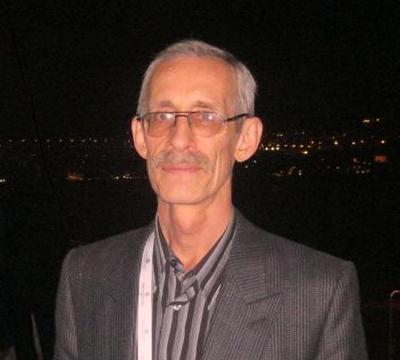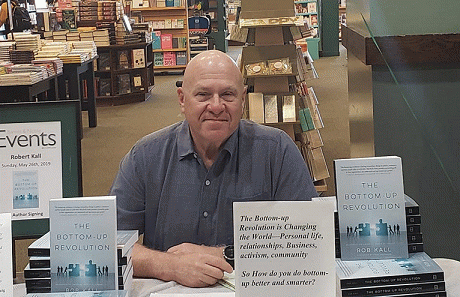Kall calls this 'gayan', as contributors and management are directly interconnected in a symbiotic, transparent relationship. Writers can 'fan' their favorite writers at Opednews and both comment, generating discussions of controversial topics, and contact other members directly.
I have been a member since 2008 and can attest that it is a unique site, allowing would-be writers to submit, learning the ropes and getting feedback to hone their skills. It struggles with the tension between being open to new ideas, but constrained by the existing zeitgeist. Writers are warned on submitting to 'think twice' about using red-flag words (scatology, Hitler, Zionist), and the editors can just not publish something. Publishing progressive material which is highly critical of the powers-that-be (including PCness) is not easy.
So I have bitten my share of bullets, but I understand the 'why' of censorship/ restraint in the interests of social harmony. In Soviet days, I would warn Soviet dissenters 'don't throw the baby out with the bathwater.' It is my mantra in face-off with Iran critics today. As a progressive, I experience (unjust) censorship every waking minute in our 'land of freedom'.
Kall's baby is the only 'open source' publishing enterprise of a professional calibre, where intelligent newcomers to politics can cut their teeth. Like open source software (which I'm using to write this review), it is a great example of 'bottom-bottom', 'bottom-up' (screw the 'up-up' guys!).
Kall uses his concept to look at the broader civilizational problems, especially economics, and The Bottom-Up Revolution is a thorough analysis of the Internet from an optimist's point of view. He uses the classical depiction of the economy as generating a surplus, first in agriculture and then in industry, and who controls this surplus as technology evolves. Marx's insight -- 'forces of production determine the relations of production' -- today, must grapple with the Internet. How does it change who we are, how we relate?
Of course, it is the top, the 1%, who shape us and any technological advances which are deemed profitable, and thus incorporated into the economy. And interactions in the economy are in the first place top-down, until, that is, there is some kind of revolution which empowers the bottom.
Bottom-up is democratic and should be our model. Are we living through such a revolution?
Kall says yes. He points out that native cultures were first seen as savages living in a world of bare survival. As indigenous cultures were conquered and destroyed with the rise of modern-day (i.e., capitalist) imperialism, anthropologists beginning in the 19th century began to study indigenous cultures (i.e., 3/4 of the world) 'scientifically', and they showed that this was not the case. Those cultures worked 2-3 hours a day to survive. They are the 'wealthy' civilizations. Their lives had just as much (more?) meaning as our 9-to-5 civilization, and they lived with mostly symbolic fighting, and generally in harmony with nature. Yes, there are Easter Islands of disaster and Genghis Khans, but WWII killed more people than Genghis Khan (40m), and our current environmental metal down and threat of nuclear holocaust mean the sky's the limit these days.
So is the Internet the silver bullet? Are the 99% learning the ropes, open to critical thinking, ready for action to overcome our flirtation with armageddon?
Kall's hope is that revolution has been 'catalyzed' by the Internet and the web. He sees the turning point as the 1980s, and looks to those born after 1980 for the new society, which should be more democratic, more caring, because it's "about connection". "The brain's functioning differently."
Kall makes an ambitious claim. Is the brain really functioning differently, i.e., better? My impression, returning to Canada from living abroad (the Soviet Union, Russia, Uzbekistan, Egypt) for two decades, is that most young people are shallow, mesmerized by iphones as they stumble down the street, oblivious to their real world surroundings. And the Internet is as much a swamp, full of dross, as it is a source of the 'truth'.
In The Age of Addiction: How Bad Habits Became Big Business(2019), David T. Courtwright points with alarm to "limbic* capitalism", an age of mass addiction, "addiction by design". The corporations controlling us engineer, produce and market potentially addictive products in ways calculated to increase demand and maximize profit. They devoted a share of their profits to buying off opposition. What results is "the inversion of the forces of reason and science that made it possible."
I personally know young guys who became addicted to video games, failing in high school and/or university. At the same time, softcore addictions (porn, alcohol, marijuana) are increasingly acceptable. While punishing users by law is wrong, encouraging such behavior is just as wrong. We need authority, structure in our lives, especially in the formative years.
Kall's optimism is uplifting, and we should definitely look to how we can mobilize people to use the Internet for the good. But it is clear to me that responsible government, removed from corporate control, is what is most vital.
It is the chicken and egg problem. We must use the Internet to pursue responsible government. Without responsible government, the corporations will ruin this technology, just as it developed and used all previous technological advances to pursue profit and war.
(Note: You can view every article as one long page if you sign up as an Advocate Member, or higher).






